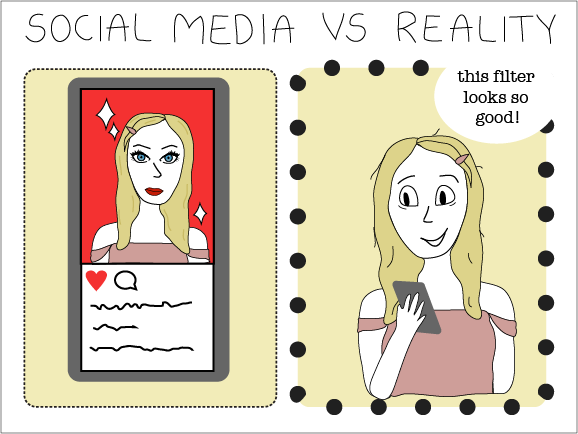Social media provides unrealistic images that impact mental health

Images posted on social media by celebrities and influencers can have a lasting impact on one’s mental health.
May 3, 2021
A conversation we always seem to have is surrounding the way social media implies certain body image expectations. Images of celebrities, like the Kardashian-Jenner family and other influencers, have flooded people’s social media feeds presenting an unrealistic beauty standard that can lead to many mental health and body issues.
It almost feels like a comparison game; many desperately want to replicate the looks of their favorite influencer. In this social media-dominated world, many tend to present themselves differently from who they are in real life. Throughout this pandemic, that hasn’t really changed as much. In fact, it may have gotten worse.
According to Natalie Peikoff, a psychotherapist specializing in body and image eating disorders, body image struggles have gradually increased during the pandemic as people remain isolated and connect mainly through social media. Peikoff adds that we live in a world that idealizes smaller bodies and treats them better than bigger bodies.
In the case of influencers, their followers tend to see them as average people instead of celebrities and athletes who they expect to be fit or “perfect.” Having this view in mind, when people see influencers with fit bodies, they began to think negatively about their own bodies.
It’s hard not to be affected by it because if your social media feed is filled with influencers promoting unattainable beauty standards, it would be tough to separate yourself from their posts. Although social media is gradually shifting into a body-positive space, there is still a lot that needs to be done.
Take the recent situation with Khloe Kardashian, for example. An unedited photo of the reality star surfaced on the internet and was almost immediately taken down utilizing copyright powers. The image itself was a trending topic, bringing up the subject of unrealistic beauty standards the family promotes.
Many on social media were quick to sound off how Kardashian shouldn’t shy away from posting photos showing an unfiltered version of herself rather than her usual content. While social media users also felt bad for her being subjugated to the scrutiny of online bullying, the reality star missed the chance to take accountability in her statement regarding the image and her issues.
While I’m sure many of us are “image-literate” at this point, it doesn’t hurt to acknowledge that the images we see online from influencers and celebrities are carefully thought out by their teams. As I’ve mentioned, the shift to a more positive and inclusive environment on social media is gradually happening. The more influencers — and ourselves — begin to reject conventional beauty standards, there’s a probability that we will see less of these images.
But unfortunately, it isn’t guaranteed that this will happen, considering that you can’t expect beauty or body standards just to disappear. The best thing to do is limit how much time you spend on social media, unfollow pages that may promote an unrealistic image, and, more importantly, dismiss the mainstream beauty and body standards.
Tania Ortiz is the Opinion Editor for The Cougar Chronicle. She is a senior at CSUSM as a communication major. Tania plans to pursue a job in the media industry after graduation. In her free time, she enjoys reading, going on runs and spending time with friends.


Adrienne Merrill • Jul 26, 2021 at 2:23 pm
Thank you for your article. It all started with Facebook. Trying to stay connected with friends, family and colleagues. Networking and keeping in touch were the purpose. Then Instagram came along and everybody you knew was there but now celebrities andinfluencers took over. People you didn’t know but wanted to were in your inbox. It created a false sense of imagery,self worth, and values. Always posing at some beautiful local or wearing the newest and or most expensive it is unrealistic. Most working class people pre covid worked their ****’s off and now with the unemployment rate can only dream of going to Ibiza, Mallorca or wherever the jet set are going. These influencers and celebrities are lucky granted but they have lost touch with the harsh reality of most people. We can only dream to be like them but would we when the dream is only an illusion.